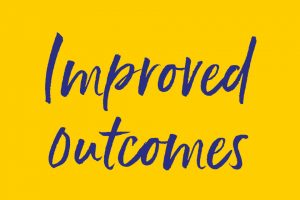
How would teachers and social workers react if the Department of Education didn’t exist?
That’s a question I pose to new starters. After all, we’re not doing the teaching or social work ourselves – that’s done in schools, colleges, nurseries, councils and so on, and they would carry on without us. We’re here to make things work better for those people and for the children and adults they serve. Otherwise, we’re simply an expensive overhead. So, let’s do our absolute best to make sure that we're valued for the helping hand we offer.
 This ‘user-centred approach’ is at the heart of 100 90-minute workshops that the 6,000 people who work for the Department for Education are taking part in this month and next. We’re engaging them in a conversation about how we can all work in more user-centred ways, from regularly visiting users to see the real-life impact of our policies and services, to working with them to co-design solutions to the problems they face. We’ll be exploring what can go wrong if we don’t take the time to understand what learners and other users really need (as opposed to what we think they need). And we’ll look at how to work with them to do it right.
This ‘user-centred approach’ is at the heart of 100 90-minute workshops that the 6,000 people who work for the Department for Education are taking part in this month and next. We’re engaging them in a conversation about how we can all work in more user-centred ways, from regularly visiting users to see the real-life impact of our policies and services, to working with them to co-design solutions to the problems they face. We’ll be exploring what can go wrong if we don’t take the time to understand what learners and other users really need (as opposed to what we think they need). And we’ll look at how to work with them to do it right.
Some of our users are feeding their uncensored views direct into the workshops about how we could support them better. And we’re sharing great examples of how we succeed when we work in partnership to make a really practical difference on the ground.
To take adult education as an example, the Individual Learning Accounts scheme launched in 2000 to give money to people to retrain, was based on untested assumptions about how they would behave. The result was large sums spent on people who were already well-qualified, rather than those it was aimed at!
We are now designing the National Retraining Scheme in a very different way, including listening to hundreds of potential users about what they really need. We’ve found that what individuals want in the end isn’t retraining, of course, but a route to a new job. And what a number of employers are asking for is for people with employability skills, who they can then train in specific job-related tasks. So, we’re designing some prototype services to test with users, to see how they respond in practice.
 Being more user-centred means being much more diverse and inclusive in the way we work, of course, because our users are very diverse, and need us to engage with them in many different ways. Which is undeniably a big challenge as we aren’t as diverse as we should be, particularly at senior levels. But we are determined to put this right, as was evident at last month’s Senior Civil Service Conference, which was done in partnership with our active BAME Network and the chairs of all the other networks too. And we’re focusing on practical action, like training, mentoring recruitment and holding leaders to account for ensuring that our performance management systems are used fairly.
Being more user-centred means being much more diverse and inclusive in the way we work, of course, because our users are very diverse, and need us to engage with them in many different ways. Which is undeniably a big challenge as we aren’t as diverse as we should be, particularly at senior levels. But we are determined to put this right, as was evident at last month’s Senior Civil Service Conference, which was done in partnership with our active BAME Network and the chairs of all the other networks too. And we’re focusing on practical action, like training, mentoring recruitment and holding leaders to account for ensuring that our performance management systems are used fairly.
 We’re ambitious for other improvements in the way we work too. We’re seeking to become a lot less hierarchical, more evidence-driven, and joined-up in the way we make things happen. In place of the traditional divide between ‘policy’ and ‘delivery’, we are creating teams of people who bring their different but complementary skills to tackle the task at hand, whether that’s teacher recruitment or the creation of new teaching qualifications for 16 year olds.
We’re ambitious for other improvements in the way we work too. We’re seeking to become a lot less hierarchical, more evidence-driven, and joined-up in the way we make things happen. In place of the traditional divide between ‘policy’ and ‘delivery’, we are creating teams of people who bring their different but complementary skills to tackle the task at hand, whether that’s teacher recruitment or the creation of new teaching qualifications for 16 year olds.
All in all, it’s an exciting time to be working for the Department for Education.

1 comment
Comment by Leanne Smith posted on
This focus on users, is not at the expense of listening to the experts, is it? I'd hope you did keep in touch with world-class thinking. Will your policy-making be in the open? Because that helps challenge and innovate. And will you being using new ways of engaging people and drawing on new insights? This was all written about four years ago by your predecessor.